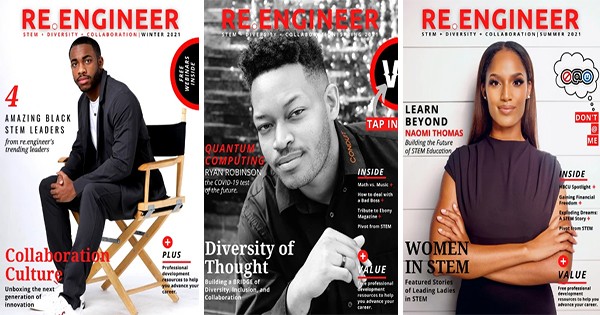New STEM Magazine Inspiring Minority Youth to Pursue STEM Careers
Black and other minority students and professionals aspiring to excel in Science, Technology, Engineering, and Mathematics (STEM) careers now have a new resource to enrich their journey thanks to a new digital publication called Re.engineer Magazine.
According to The National Center for Science and Engineering (NCSE), there has been a decline in the number of engineering degrees awarded to Black students. The statistics indicate that the number fell from 5.2% in 2000 to 3.9% in 2016. This downward trend has negatively impacted the representation of minorities in the various STEM disciplines. A lack of diverse mentors and discrimination bias in STEM are among the top factors for the decline; however, the number one reason cited for not pursuing STEM careers is Imposter Syndrome; students feel a sense of “fraud” and that they are not adequately prepared to compete amongst their peers.
Re.engineer is an interactive digital experience that is on a mission to change the narrative by inspiring Black students to pursue STEM careers. The magazine offers a fresh, new perspective of value that provides empowering insights and information to STEM students and young professionals. Each quarter the magazine features professional development content, thought-provoking articles, videos, and interviews with minority STEM leaders that provide inspiring examples of possibilities. Re.engineer connects students and young professionals with experienced professional advisors, as well as offers access to free professional development resources. The magazine also provides access to group mentoring, career hacks, webinars on STEM-related topics, and more.
Award-winning engineering leader and community advocate, Shadrach Stephens, is the architect behind Re.engineer. Stephens holds a Bachelor of Science Degree in Electrical Engineering from the Historically Black College and University (HBCU) Southern University and A&M College, and is the Global Improvement Leader and Reliability Director for the Environmental Technology Center, Dow Inc. When asked about the motivation for creating Re.engineer Magazine, he explained: “I am a firm believer that we need more examples of the possibilities. I wanted to create a platform that highlights black excellence in STEM while also providing valuable resources for the next generation of professionals. Our team of volunteers is building a bridge between advanced and entry-level professionals to help them leverage solutions, techniques, innovation, and leadership perspectives.”
Praise is already pouring in for Re.engineer Magazine in its quest to increase minority representation in STEM. One reader summed up the overall impact of the magazine. He said: “There’s really so much to love in Re.engineer. The emphasis on being united in a competitive environment is the most valuable to me. That’s what our community and the world needs. I also love the interviews. They really show some diversity within the field with content I hadn’t considered as being related to STEM.”
Re.engineer Magazine is available as a subscription and is published quarterly. The spring issue is currently available for reading pleasure and insight. For further information or to subscribe to the magazine, visit www.reengineer.co/reengineermagazine
(Editor’s Note: This story first appeared in Black News)



